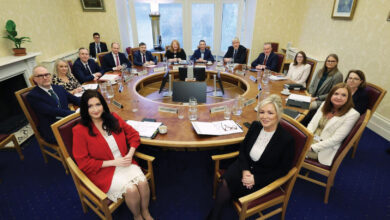The £1 billion gap

“How do you bridge that £1billion pound gap?” asked Chief Executive of the Northern Ireland Housing Executive, Clark Bailie, in a recent interview with Inside Housing that highlighted the need to invest substantially in the organisation’s existing stock.
A stock condition survey carried out by Savills in 2015 suggested that there has been significant underinvestment in the Northern Ireland Housing Executive stock since 2009, with £7 billion investment needed over the next 30 years (£340 million each year over the next five years) and nearly half the stock requiring immediate investment.
That was 2015. So, the NIHE needs to invest and it needs to invest fast. Current public sector borrowing rules means it cannot raise the private finance to match government funding that housing associations can. However, it has a substantial asset base that would be attractive to lenders.
In its current status it could refinance its existing historic debt of over £400 million at a lower interest rate raising around £77 million per year and it is believed that several banks would be willing to make loans on this basis. It could raise finance by increasing rents (it currently collects £290 million per year), which are comparably much lower than average housing association rents and similar regions in other parts of the UK. However, this needs political support and recent rent freezes haven’t helped. The absence of ministers and an Assembly makes it difficult to change the organisation’s status and its ability to raise rents.
We have missed a trick regarding the amount of money that could have been invested in existing stock and the local economy, had serious decisions been taken. Take, for example, Glasgow Housing Association (GHA), a part of the Wheatley Group. I am on the boards of both and have witnessed at first hand the success of major investment matched by private finance.
GHA was formed in 2003 when Glasgow City Council transferred its stock and was a similar size to what the NIHE is now. Since then GHA has borrowed £811 million to date (Wheatley overall borrowing is £1.1 billion). Grant investment in existing stock has been £400 million, then roughly £300 million from rental income over the 15-year period has gone to the improvement of the existing stock. Average rents in Glasgow are around £20 per week higher than NIHE rents and are still considered affordable, with a high proportion of tenants consistently stating that they get good value for money.
Without the borrowing and the grant investment (if GHA had to do it all from just rental income) the impact would have been nowhere near the same, and in fact, some of the stock may not have become sustainable in the way it is today. Over the period it was suggested to me that GHA would have lost around 20,000 stock had it not invested in it.
In Northern Ireland, if we lost a similar amount, that would be the equivalent of around 15 years of new build. Not only has the life of GHA properties been prolonged, the CO2 reduction has been 30 to 40 per cent depending on the house type over the period, helping save fuel costs and meeting national climate change targets as well.
An evaluation of the economic impact of GHA from 2003 to 2018 by the Fraser of Allander Institute found that from £577 million of Scottish government capital grant, a boost was delivered to GDP of £2 billion (3.5x multiplier). This has not only transformed the city of Glasgow and the lives of its communities, but it supported 2,500 FTE jobs per year. The investment in its stock also made possible a huge leverage of private finance as properties grew in value.
Investing in existing stock is therefore hugely important, not only for preventing its decommissioning, a word widely used by NIHE, but for the economic benefits that we have seen in Glasgow. There is a danger that if NIHE stock is allowed to deteriorate further, its own tenants will be disadvantaged in comparison with tenants of housing associations. One senior housing official stated that it would in fact make them second class citizens.
Something needs to be done and it needs to be done soon. A fundamental review of the status of the NIHE is required to enable it to attract the necessary finance to ensure long term investment in its stock. This will not only prolong the life of its existing properties, but it will sustain its income and improve the lives of its existing tenants so that they are on an equal footing with other social tenants.
Without it, stock will fall further into disrepair, tenants will be less willing to pay rent, there will be higher turnover with costly void periods, and parts of the stock will have to be demolished meaning longer waiting lists and greater housing stress.
Professor Paddy Gray is Interim Director of the Chartered Institute
of Housing.





